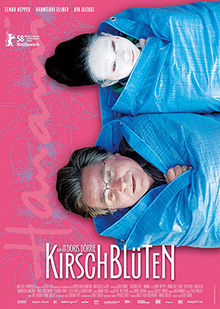- Cherry Blossoms (film)
-
Cherry Blossoms 
German promotional posterDirected by Doris Dörrie Starring Elmar Wepper
Aya Irizuki
Hannelore Elsner
Maximilian Brückner
Nadja Uhl
Birgit MinichmayrMusic by Claus Bantzer Release date(s) 2008 Country Germany Language German/Japanese/English Cherry Blossoms (German: Kirschblüten – Hanami) is a 2008 German film directed by Doris Dörrie.
Plot
The story culminates in a pilgrimage to Mount Fuji in the midst of the cherry blossom season, a celebration of beauty, impermanence, and new beginnings.
Trudi (Hannelore Elsner) and Rudi (Elmar Wepper) are an affectionate, long-married couple whose children have grown up and moved away. They live in a small Bavarian village. Trudi learns that her husband is terminally ill. The doctor suggests a final adventure, which the two wanted to have for some time, but never managed.
Trudi decides to keep the disease secret from Rudi. She manages to convince him to visit their children and grandchildren in Berlin. But when they arrive, they realize that their children are too busy with their own lives to take care of the parents. Then they decide to drive to the Baltic Sea. But there, Trudi suddenly dies. Rudi is thrown completely off track and doesn't know how to go on. After he learns from a friend of his daughter that Trudi has actually sacrificed her life out of love for him, he starts to see his dead wife with new eyes.
Rudi tries to make up for the loss of his wife. As her secret passions were Japan and the Japanese Butoh dance expression, Rudi travels to visit his son in Tokyo. As the situation gets too claustrophobic, his son wishes his father to go away. Then Rudi goes to a park full of cherry blossoms. He meets an eighteen-year-old Japanese girl named Yu (Aya Irizuki). She catches his eyes because she dances Butoh there every day. Yu lives in a tent and has lost her mother only a year ago, so she understands Rudi's feelings. She helps him get by in the big city. Despite the language barrier--they have to speak English-- and huge cultural differences, they soon get along very well. Since Trudi has always talked about how much she wanted to see the sacred Mount Fuji, Rudi persuades his new companion to travel there together with him. Mount Fuji is so "shy" that it constantly hides behind clouds, so they put up in a hotel room beside a lake and wait for better weather. Rudi's health is deteriorating. One day, when he wakes up in the night restlessly and stands in front of the door, the mighty Mount Fuji greets him in the bright moonlight. Rudi lies down on the clothes of his wife, puts on make-up like a Japanese dancer, and begins to imitate the slow movements of Butoh at the lakeside. In his last vision, his dead wife appears to him and holds his hand. Then they unite to create a dance before the sublime backdrop of mountain and water. The next morning, when Yu sees Rudi's empty bed, she looks for him and finally finds him dead on the shore of the lake. In his luggage, there is a parcel written "For You, Yu". Inside the parcel, Rudi has left her his life savings.
Two contrasting scenes conclude the film: On the one hand, in a solemn cremation ceremony, his son and Yu are balancing the remaining ashes of Rudi's bones with chopsticks in a Japanese urn. On the other hand, the film ends with a table discussion by his children out of complete misunderstanding of their father – their indignation at his grumpiness and adventures with Yu, and his scandalous soft spot for Trudi's clothes.
External links
Cinema of Germany 
Film chronology · German Empire 1895–1918 · Weimar Germany 1919–1933 · Nazi Germany 1933–1945 · East Germany (1945–1990) ·
(West) Germany 1945–present · 1945-1959 · 1960s · 1970s · 1980s · 1990s · 2000s · 2010s
Actors · Directors · Films A–Z · Cinematographers · Festivals · Producers · Composers · ScreenwritersCategories:- German films
- German-language films
- 2008 films
Wikimedia Foundation. 2010.
